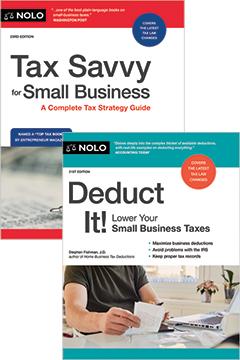Resolve disputes and collect debts in small claims court -- without a lawyer.
Because small claims court dollar limits are rising, small claims court is an increasingly attractive arena in which to resolve business disputes quickly and cheaply.
The very people that business owners rely upon -- their subcontractors, suppliers, and customers -- can also be the source of all kinds of disputes. Subcontractors may leave work unfinished, suppliers may deliver subpar goods, and customers may not pay their bills.
Business owners typically can use small claims court in two main ways: to collect overdue bills or to resolve disputes with customers or other businesses.
Collecting Bills in Small Claims Court
Small claims court is particularly cost-effective for collecting unpaid bills because it eliminates the need for bill collectors and lawyers -- who often keep, as their fee, up to half of what they collect. Indeed, small claims court works so well that in many courts over 60% of the cases are filed by businesses. Because a substantial percentage of these claims are uncontested by the defendant (they know they owe the money and don't show up), little preparation or court time is needed. And best of all, many defendants who don't want their credit rating damaged pay voluntarily -- sometime between the time they receive a final demand letter threatening a small claims suit and the date a court judgment is entered.
You must have hard evidence that a debt is owed; small claims court is not biased in favor of allowing small businesses to collect debts. When defendants believe they have a good defense and fight back, they have a decent chance of winning or at least of paying substantially less than the plaintiff claims. For example, in a study of 996 small claims cases that went to trial, the National Center for State Courts found that 20% of the time the defendant won outright. In another 20% of the cases, the defendant was ordered to pay substantially less than the plaintiff demanded.
Resolving Contract Disputes in Small Claims Court
Contractual disputes between two small businesses or between a business and a customer are also common in small claims court. A business commonly argues that its goods or services were of poor quality, provided late, or not at all.
Here's an example of a typical dispute: Suppose Ted, an independent graphic designer, sues Tip Top Excavators because it won't pay him for redesigning its logo and newsletter. Tip Top's defense is that the contract was broken because the work was substandard and late, and no payment was due.
Presenting a Small Claims Case in Court
If the parties don't negotiate their own solution or arrive at one through mediation, each will have a chance to present their side of the story to a small claims court judge. A succinct and well-organized court presentation is always important. And in a close case, chances are good that the side with the most convincing written evidence will have the edge.
For example, if the graphic designer can produce a written contract (or other documents showing that a contract existed), a decent-looking sample of the redesigned newsletter, and a letter from someone with expertise in the field stating that the work met industry standards, he will be in an excellent position. The graphic designer would also be wise to prepare to rebut the likely points the opposing business will make. For example, if the design work were a few weeks late, the graphic designer would want to present a good excuse, such as the fact that the client asked for time-consuming changes.
Defending a Small Claims Contract Case
The defendant would be wise to present evidence that either the work was delivered so late that it amounted to a serious breach of the contract or that the graphic designer failed to meet other important contractual specifications (designed a 4-color, 24-page newsletter template when the contract called for a 2-color, 12-page job). Again, the more hard evidence the defendant has (such as a letter to the graphic designer pointing out the project was over the deadline and asking for immediate completion), the better the defendant's chances of winning.
After both parties have their say, the judge will decide the issue. And again, there is good news. Instead of waiting for months, as can happen in regular court, the judge will either announce a decision on the spot or mail it out in a few days. Either way, both sides will know where they stand and be able to get back to business.
For information, tips, and strategies for small claims court, get Everybody's Guide to Small Claims Court, by Attorney Cara O'Neill (Nolo).



